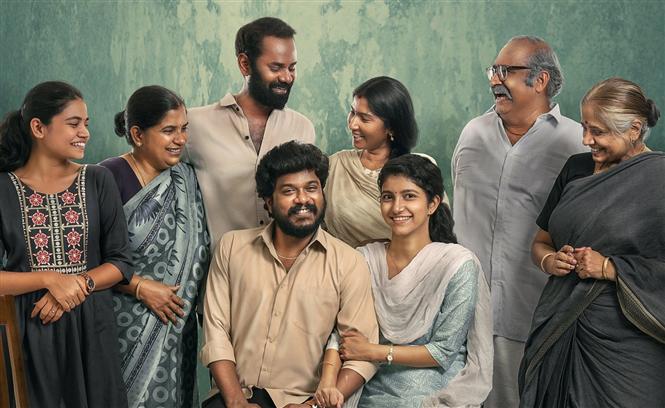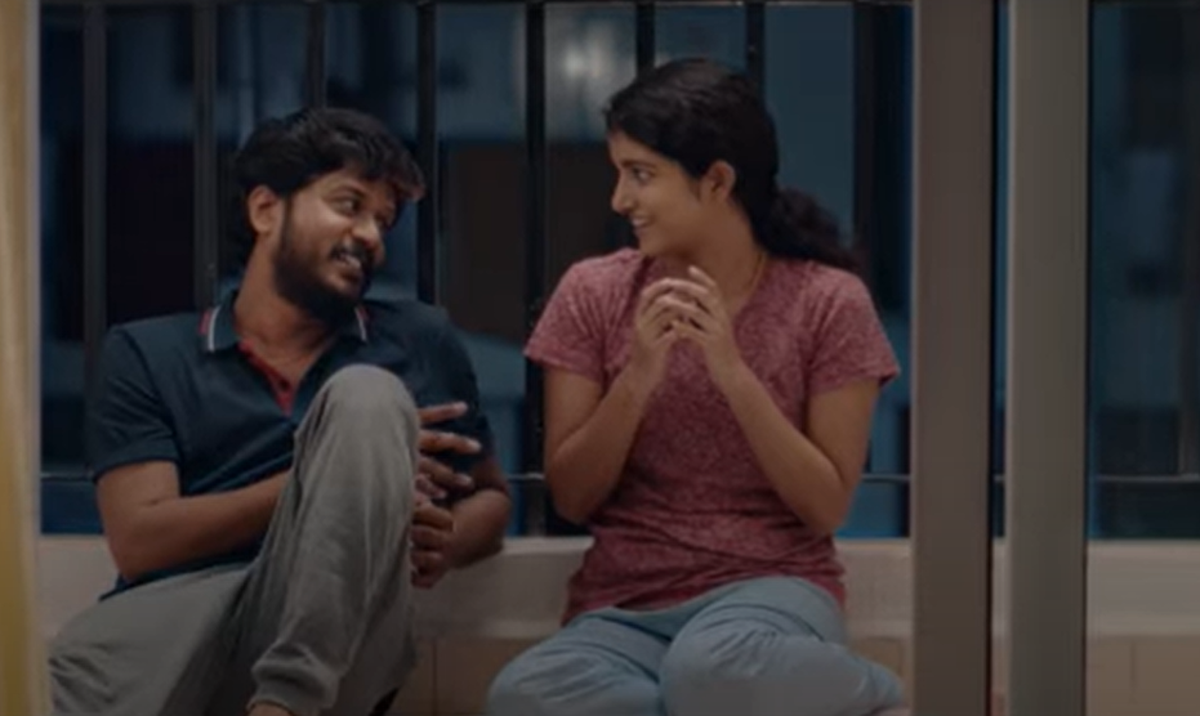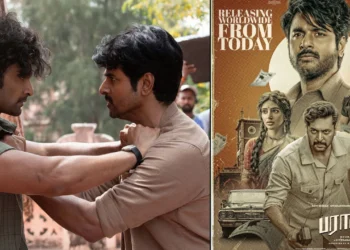The Delight and Dilemma of a Simple Plot

Good Night, which stars K. Manikandan and Meetha Raghunath as the romantic leads, is a supple, comforting, and realistic middle-class love story. But the film is more than just about romantic love; it is about family, both formed by blood and by choice. The chemistry between Meetha and Manikandan is often overpowered by the comedic and brotherly bond that Manikandan shares with Ramesh Thilak, who plays Manikandan’s brother-in-law in the film. Their comedic duo is off the charts, leaving the audience wanting more of them exchanging banter. Their body language and dialogue delivery are so natural, it’s as if we were watching the scene take place in our own living room. It is precisely because the film is natural and simple that it has made such an intimate connection with its audience.
The main conflict of the film has a quirky catch to it, but it is a problem that remains only surface-level throughout the entirety of the film. Manikandan plays a relatable middle-class boy next door with a nondescript IT job. Other than his mild sleep apnea, which causes him to snore loudly, he lives a pretty peaceful and normal life. Manikandan’s Mohan is belittled at work for his English by his boss (played by Bagavathi Perumal), and while he tries earnestly to help his female colleague against sexual harassment, he miserably fails against office bureaucracy. He is a kind-hearted underdog who tries his best to be helpful to those around him.
The character in the first half of the film is someone who tries with his whole heart to better himself. The way he falls in love with Anu (Meetha Raghunath’s character) is effortless and humbling, and their awkwardness that blossoms into friendship and eventually into mutual affection is incredibly delightful to watch. But towards the second half, something interrupts this flow. The sudden shift in Manikandan’s character and the plot of the film makes one feel that they are watching two different films. Somewhere along the way, the thoughtful compassionate Mohan we met in the first half of the film was replaced by the incompetently rude Mohan in the second half.

On the contrary, one can interpret this to mean that Mohan is still an immature young man who doesn’t truly know how to deal with his own insecurity and the newness of marriage. The main conflict of the film is Mohan himself and his inability to compromise, as Anu does in the beginning of the film. When Anu finds out about Mohan’s loud snoring, she does not make a big issue of the matter, not because she didn’t want to hurt her husband but because she never took it as a big issue in the first place. Even when his snoring causes her to lose sleep, leading her to faint because of sleep deprivation, she takes his snoring lightly. It was Mohan who made the ‘heroic’ decision to sleep in another room so as not to have his snoring disturb his wife. But Anu protests against this. His own selfish need to fix himself overpowers his wife’s loving plea for him to share her bed.
This separation between the two leads them to a larger argument, and the rift causes a near-end to their marriage. At one point, Mohan even blames Anu for the problems he faces at work; he gets drunk and yells at her, stating that ever since he married her, his life has been nothing but miserable. Somewhere along the way, even the audience feels lost, wondering where the compassionate Mohan went. Nevertheless, they make up, and the film comes to a pleasant end. Mohan does not actually learn to overcome his internal problems or truly apologise for the agony he put his wife through. Some might make the argument that slices of life films do not need to answer all the questions; they do not need to have a class analysis of how this film dangerously seduces one with the comfortability of petty bourgeoisie life.
Yes, we cannot expect that, but we can expect a man to truly understand the extent of his faults and properly apologies for them to the woman he claims to love. Although there is an apology scene at the end, it doesn’t give satisfaction to the audience, which has witnessed the alienation and misery Anu felt because of her husband. Feel-good films should not come at the expense of ignoring incredibly real and painful problems.
Anu’s character also has an insecurity, hers is of abandonment; her parents had passed away when she was really young so she feels that she is an unlucky person. She learns to overcome this thinking of hers and be apart of a real family. Anu’s silent and gentle character has a heart that bears so much love to all those around her. Even when she is not an individual for loud proclamations of love, she makes sure her love and respect is felt by all those she cares about.
Sometimes the film feels like segments of a Tamil TV serial, trying to wedge their way into the modern lives of these characters. The small tension between Anu and her mother-in-law. The bigger tensions between Mohan’s sister (Raichal Rabecca) and her in-laws. But then, the film carefully and very playfully delivers these conflicts, presenting subversive female characters played by Meetha and Raichal who deal with these antiquated societal intrusiveness in their own individual manner.
Manigandan and The Art of Screen Presence

Manikandan is an actor who knows how to share a screen with his co-stars. He never overpowers the scene, nor does he underwhelm his own performance. His acting comes alive precisely because he shares equal space with everyone on screen. He doesn’t suffocate the scene as most protagonists do but instead diplomatically interacts with all the elements and emotions in the scene. He understands that acting is a symbiosis that arises from relating to and reacting to the emotions of others around them.
Because he allows this equal relationship to be established between characters, every scene comes out naturally. Whether it is with Meetha Raghunath, Ramesh Thilak, Raichal Rabecca, or anyone else, Manikandan’s interaction with them in each and every scene is so tender and so carefully articulated. He makes an impact without exhausting the audience. Manikandan is still a young actor, but with each film, from Kaala to Aelay to Jai Bhim, he brings a new dimension to his craft. He is definitely an actor to pay attention to because his immensely captivating screen presence is something wholly special to witness.
A Precocious Marriage Against the Plague of Tradition: A Beloved Enactment by Ramesh Thilak and Raichal Rabecca

Arguably, the marital relationship between the characters played by Ramesh Thilak and Raichal Rabecca, who plays Manikandan’s elder sister, comes off as more authentic and beautiful than the main leads. Their side plot is substantially more developed than the main plot between Manigandan and Meetha. Rebecca and Ramesh play a couple who have been married for 5 years but still have not conceived a child. Their lives are disrupted by the same misery that society puts couples like them through. Ramesh goes through this wonderful journey from being a son who doesn’t stand up to his parents, who routinely degrade and embarrass his wife, to a man who is firm in placing a boundary between his inquisitive parents and his marriage.
Ramesh’s character outshines Manigandans in the category of being a good husband. Ramesh maintains tolerance, yet at times he too has his outbursts with his wife and brother-in-law but they quickly resolve themselves. He does not belittle his wife for their childlessness, not even when his wife experiences a miscarriage. His first thought about losing his unborn child was how the news of it would hurt his wife. He doesn’t even hesitate to state to the doctor, when presented with the choice between saving the life of his child or his wife: that his priority is the safety of his wife first. The sequence in that film that showed the grief of losing a child to miscarriage is incredibly heartbreaking and tender. It does not exploit the loss of the couple, who were excited to be new parents, but shows them overcoming their grief and being hopeful for their future.
Raichal Rabecca plays an exceptional role after her sequence in Kadaisi Vivasayi, which has garnered a special place in our hearts. In Tamil cinema, rarely are darker-skinned Tamil women given proper prominence, but here is a woman who looks so heartbreakingly beautiful and who has a tremendous amount of talent gracing our screens. Here’s to seeing more of this talented and beautiful actress. Her slight anger and annoyance towards her onscreen husband, Ramesh, are so intimately brought out. Her character is completely three-dimensional; she is broken at the news that she had lost her pregnancy, she is stern with her brother about how he should care for his wife, and she is present as a whole being throughout the film.
Her scenes with Ramesh, although too few, are unimaginably precious. Their portrayal of marriage is both real and magical. Both Ramesh and Raichal have done these roles a great justice. It shows how even ordinary, seemingly conventional married couples can forge against the cruelties of society. There is no radicalism in their actions because the genre of slice of life itself is not meant to radicalise its viewers but to present them with simple vignettes of middle-class complacencies and reforms. Keeping that in mind, it is also important to understand that for a film not made with criticising social structures as its aim, an important subplot of marriage and fertility is deliberately brought up and dealt with in a palatable manner for a largely domesticated and conservative Tamil audience.
Sean Roldan’s Music

Sean Roldan is definitely an incredibly quirky and unconventional music director. His own creative voice comes alive further in the film and elevates this work of art. The song Naan Gaali is a lovely thing to experience. You cannot help but smile through the song. It suits an underdog like Mohan to have this song describe his life. Lyricist Mohan Rajan has captured precisely the emotions of a boy like Mohan experiencing the honeymoon phase of his life—his marriage with the girl he fell in love with.
The shimmering feel of 1980s Ilayaraja over this ballad is perfect. Chill Makka, Palapattra, and all the rest of the album seamlessly interconnect with the fabric of the film. His songs work in parallel with the script. They entangle and create this harmonious affliction between each scene. Along with the script and the wonderful cast of characters, the music acts as another soul of the film.
This is a film made to be watched as a daydream against the nightmare of capitalist reality. Even with the sudden change of Mohan’s characterization in the second half, the first half is still very much enjoyable, and the performances of Ramesh and Raichal and their plotline are something that is perfectly paced and developed throughout the film; one could watch the film just for these two. For people looking for a feel-good film about the manageable perils of petty bourgeois domestic life, do give this film a watch.
Follow us on Instagram, Facebook or Telegram for more updates and breaking news.








